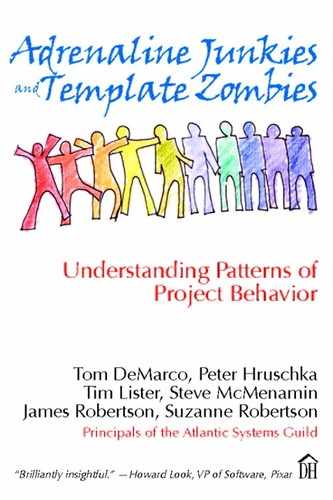25. Silence Gives Consent
,
A stakeholder fails to distinguish between resigned silence and agreement.
There is a system of commitments that ties together any project. Developers commit to do work on a schedule and to an agreed-upon level of quality; the organization commits to pay salary and benefits and to provide the wherewithal necessary to get the tasks done (infrastructure, support, hardware, access, and so on).
Some of these commitments are very explicit, while others are more or less implied. For example, did your company actually commit to provide you with access to all the busy people whose input you’ll need in order to finish on time? Or was that only implied?
The system of commitments breaks down when the maker and receiver have different interpretations of whether a commitment has been made and/or what exactly it was. Discontent, when it occurs in an organization, is very often centered on implied commitments that were understood in different ways. Implied commitments can be a trick of the light, taking on a different form depending on where you sit. You may hear a manager complain, “He promised me this deliverable by the first of the year, slipped the date, gave me another date, slipped it, gave me a third date, and now that one is slipping as well.” The developer might view the same interaction completely differently: “I never gave him a date; I certainly never agreed to that date.”
A common way that commitment misunderstandings happen is this: One party expresses need, and the other nods in understanding. The first party takes this as a commitment: “I told him I had to have it by December thirty-first, that it was absolutely essential.” The other party takes this as whistling in the dark: “Sure, he’d like it by the end of the year, but that wasn’t going to happen.” The one who expresses the need is almost always someone with more clout, and he bases his expectations on an old maxim from the legal system: Silence gives consent. If you don’t say no to such a person, you have said yes.
Silence-gives-consent commitments are bad for everyone. The two parties inevitably attach differing priorities to the work, and it’s all bound to end in tears. In the abstract, the problem looks tractable: People have to learn to say no. But the real world is not abstract; it’s full of messy particulars. The messy particular we most commonly see is that a project is already overcommitted, new needs appear at an astonishing rate, and implied commitments multiply like rabbits. In such a situation, if you were the overcommitted developer and a manager came to you expressing the need for yet something else to be done by December 31, who could blame you for just shrugging?
A discipline that makes implied commitments markedly more manageable is to declare publicly a small number of important commitments. They are written down and shared with all parties. The maker and receiver of the commitment have to agree on the wording before the commitment is revealed to anyone else. This only works if the number of explicit commitments is kept small and if they are indeed the ones that matter.
There’s no commitments book, just a short commitments list. It names the individuals who have promised certain results by certain dates. The committer, in this case, is bound to give priority to public commitments over the other wishes that land on his desk. The rule of silence gives consent is thus repealed: Only consent gives consent.
